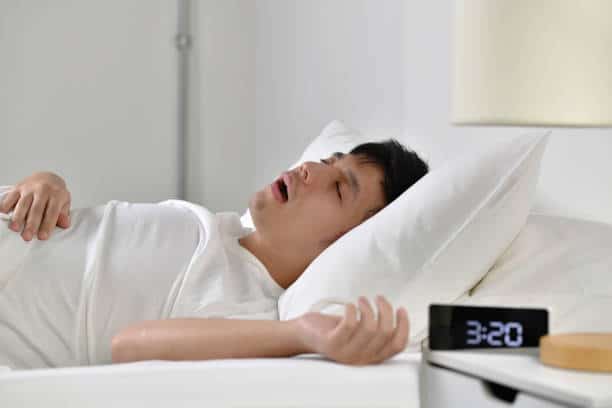Are you constantly feeling tired, even after a full night’s sleep? Are you struggling to stay awake during the day or feeling irritable and moody? These might be signs of a common sleep disorder called mild sleep apnea. While most people associate sleep apnea with loud snoring and choking during sleep, many symptoms can indicate this condition’s presence.
In this blog post, we’ll take a closer look at mild sleep apnea symptoms and what you can do to get the help you need.
What is Mild Sleep Apnea?

Mild sleep apnea, also called mild obstructive sleep apnea (OSA), is a sleep disorder in which a person repeatedly stops breathing or breathes very shallowly while sleeping. These can happen several times a night and last a few seconds to a few minutes. It is called “mild” because fewer than 15 episodes per hour exist.
Mild Sleep Apnea Common Symptoms
- Loud snoring: This is a common symptom of sleep apnea, which can be caused by the vibration of the soft palate and other structures in the upper airway during breathing.
- Gasping or choking during sleep: These are signs that the airway is partially or completely blocked, causing the person to wake up briefly to open the airway.
- Pauses in breathing during sleep: This occurs when the airway is blocked, preventing the person from getting enough oxygen.
- Insomnia or difficulty falling asleep: Sleep apnea can make it difficult to fall asleep or stay asleep, leading to insomnia.
- Fatigue or excessive daytime sleepiness: The lack of quality sleep caused by sleep apnea can lead to fatigue and excessive sleepiness during the day.
- Morning headaches: A common symptom of sleep apnea, caused by the lack of oxygen and the increased pressure on the blood vessels in the brain.
- Difficulty concentrating: The lack of oxygen and poor quality sleep can affect cognitive function and make it difficult to focus.
- Irritability or mood swings: Due to lack of restful sleep, sleep apnea can affect mood and cause irritability and mood swings.
It’s important to note that not everyone with sleep apnea will experience all these symptoms, and some people may experience different symptoms altogether. However, suppose you are experiencing any of these symptoms. In that case, it’s essential to speak with a healthcare professional to determine if you may have sleep apnea and what treatment options are available.
Also Read: Which CPAP Doctor Should I Talk To About My Sleep Apnea
The Risk Factors of Mild Sleep Apnea
Several risk factors can increase a person’s likelihood of developing sleep apnea. Some of the most common risk factors include:
- Obesity: Excess weight can put extra pressure on the airway, making it more likely to collapse and cause sleep apnea.
- Family history of sleep apnea: There is a genetic component to sleep apnea, and if a family member has the condition, it increases the likelihood of developing it.
- Smoking or alcohol use: Both smoking and alcohol can relax the muscles in the airway, making it more likely to collapse and cause sleep apnea.
- Age: As people age, the muscles in the airway become less toned, making it more likely to collapse and cause sleep apnea.
- Gender: Men are more likely to develop sleep apnea than women, although the risk increases in women after menopause.
- Certain medical conditions: Sleep apnea is more likely to occur in people with certain medical conditions such as high blood pressure, diabetes, and heart disease.
- Nasal congestion or other nasal problems: People with chronic or other nasal issues are more likely to develop sleep apnea.
- Chronic use of sedative medications: People who take sedative medications regularly are more likely to develop sleep apnea.
It’s important to note that having one or more of these risk factors does not mean a person will develop sleep apnea but increases the likelihood. To address your concerns about the risk of sleep apnea, it is crucial to consult a healthcare professional who can assess whether you need to undergo testing for the condition.
The Importance of a CPAP Machine
A CPAP (Continuous Positive Airway Pressure) machine is a standard treatment option for mild sleep apnea. The machine delivers a steady stream of air pressure through a mask worn over the nose or mouth during sleep. This air pressure helps to keep the airway open, preventing the collapse of the airway that causes the apneic episodes characteristic of sleep apnea.
A CPAP machine is considered an effective treatment for mild sleep apnea symptoms because it can help to reduce the number of apneic episodes, improve the quality of sleep, and alleviate it like occasional loud snoring, slight daytime drowsiness, and infrequent morning headaches. It also reduces the risk of developing more severe forms of sleep apnea and the associated health consequences such as hypertension, heart disease, and stroke.
It’s important to note that a sleep specialist or pulmonologist prescribes CPAP machines after a sleep study, and the patient must use them regularly as prescribed. Additionally, regular follow-up appointments with the healthcare provider are necessary to ensure the machine works correctly and make adjustments as needed.
Overall, a CPAP machine is a highly effective treatment for mild sleep apnea that can help to improve the quality of life for those with the condition. It is essential to discuss with your healthcare provider if a CPAP machine is an appropriate treatment for you.
Also Read: The Longterm Benefits of Using a CPAP
Diagnosing and Treating Mild Sleep Apnea

Diagnosis of sleep apnea typically begins with a visit to a healthcare provider, who will take a detailed medical history and perform a physical examination. The provider may also refer the patient to a sleep specialist for further evaluation.
The most commonly used diagnostic tool for sleep apnea is a polysomnogram (PSG), which is a test that measures brain waves, eye movements, heart rate, and other physiological parameters while the person sleeps. This test helps diagnose sleep apnea.
Treatment options for sleep apnea may depend on the severity of the condition. If you have mild sleep apnea, you may need one of the following treatments:
- Lifestyle changes: Losing weight, quitting smoking, and avoiding alcohol can help to reduce the symptoms of sleep apnea.
- Continuous Positive Airway Pressure (CPAP): This treatment involves using a machine that delivers a steady stream of air through a mask worn over the nose or mouth during sleep. This helps to keep the airway open and prevent pauses in breathing.
- Oral Appliance Therapy: This is a custom-made device, worn in the mouth at night, that repositions the jaw and tongue to help keep the airway open.
- Surgery: In some cases, sleep apnea patients may need surgery to remove extra tissue from their airways or fix structural problems that are causing their sleep apnea.
It’s important to note that treatment for sleep apnea is ongoing and requires commitment and follow-up with the healthcare provider. It’s also important to note that mild sleep apnea is still a severe condition and should not be ignored. If you think you have sleep apnea, you must consult your healthcare provider to determine if testing and treatment are appropriate.
Frequently Asked Question
What are the most common symptoms of mild sleep apnea?
The most common symptoms of mild sleep apnea include loud snoring, frequent awakenings during the night, feeling excessively sleepy during the day, and difficulty staying asleep. Other symptoms may include morning headaches, dry mouth or sore throat upon waking, and difficulty concentrating or remembering things.
How to diagnose sleep apnea?
Mild sleep apnea is often diagnosed with a polysomnogram (PSG), a test that monitors brain waves, eye movements, heart rate, and other physiological characteristics while the patient sleeps. The results of this test, normally performed in a sleep lab, identify the existence and severity of sleep apnea.
What are the risk factors for mild sleep apnea?
Risk factors for mild sleep apnea include being overweight or obese, having a large neck circumference, smoking, and consuming alcohol. Other risk factors may include:
- Having a family history of sleep apnea.
- Being older than 50.
- Having certain medical conditions such as diabetes or high blood pressure.
What are the treatment options for mild sleep apnea?
Treatment options for mild sleep apnea may include lifestyle changes, such as losing weight and quitting smoking, using a continuous positive airway pressure (CPAP) machine, oral appliance therapy, and surgery in some cases.
Is mild sleep apnea curable?
Although mild sleep apnea is treatable and manageable, it is not curable. Treatment will need to be ongoing, and regular follow-up with a healthcare provider is necessary to ensure the best outcomes.
What is central sleep apnea?
Central sleep apnea (CSA) is a sleep disorder that affects a person’s ability to breathe properly while they are sleeping. Unlike obstructive sleep apnea (OSA), which is caused by a physical blockage in the airway, CSA occurs when the brain fails to send the proper signals to the muscles that control breathing.
Conclusion
Mild sleep apnea, a prevalent condition, is characterized by symptoms like intermittent loud snoring, waking up often during the night, daytime fatigue, and challenges in staying asleep. Recognizing these mild sleep apnea symptoms is vital, as untreated, it can escalate to serious health issues.
If you suspect that you or a loved one may have mild sleep apnea, you must take action and speak with a healthcare professional for proper evaluation and treatment. This can include lifestyle changes, such as losing weight and quitting smoking, using a continuous positive airway pressure (CPAP) machine, oral appliance therapy, and surgery in some cases.
Don’t let sleep apnea disrupt your life. Check out our selection of CPAP accessories to enhance your treatment and enjoy uninterrupted sleep. Thanks for reading!
Please share your thoughts with us if this article enlightens you. Thanks for reading!



